Very nice AirAir.
I just double-checked mine and they are the exact same. AS318-B. I was worried I made a noob mistake for a second on my end.
I looked at your GB and great choice on going SuperCaps. I went SuperCaps last minute as well.
Nice little review here:
IAN CANADA UCCONDITIONER Ultra Capacitor Conditioner Board 3.3V - Audiophonics
Similar impressions on Ian's Power thread...
I just double-checked mine and they are the exact same. AS318-B. I was worried I made a noob mistake for a second on my end.
I looked at your GB and great choice on going SuperCaps. I went SuperCaps last minute as well.
Nice little review here:
UCconditioner
A fantastic product that works as I was hoping for. My dac is at a new level after ian’s UCcoditioner was installed between psu and ian’s fifoPi. Accusilicon on fifoPi perform better with cleaner power from the UCconditioner with super capacitors from Maxwell. Highly recommended !
IAN CANADA UCCONDITIONER Ultra Capacitor Conditioner Board 3.3V - Audiophonics
Similar impressions on Ian's Power thread...
Thanks! All is well!
If there was a choice, then instead of economy delivery (not tracked in my country), I would choose a more expensive one.
sorry for your unhappy...
I can understand your feeling of waiting, so in this process, I have always been very concerned. Before it entered the Russian Federation, there had been tracking information, but no information just entered the Russian Federation. So I wrote to ask you for information.
However, the price of the clock itself is not high. If you choose a more expensive courier, the cost will be several times the price of the clock.
Very nice AirAir.
I just double-checked mine and they are the exact same. AS318-B. I was worried I made a noob mistake for a second on my end.
I looked at your GB and great choice on going SuperCaps. I went SuperCaps last minute as well.
Nice little review here:
IAN CANADA UCCONDITIONER Ultra Capacitor Conditioner Board 3.3V - Audiophonics
Similar impressions on Ian's Power thread...
If you are interested in Ian's products, you can buy directly from him, it will be cheaper. I own most of Ian's modules, but I don't like Ultra Capacitor Conditioner, because Ultra Capacitor is useless in my system.
GitHub - iancanada/DocumentDownload: Download documents of Ian's products
If you are interested in Ian's products, you can buy directly from him, it will be cheaper. I own most of Ian's modules, but I don't like Ultra Capacitor Conditioner, because Ultra Capacitor is useless in my system.
Thanks for the buying advice and for the early clarification between AS318 and AS318B over the Summer.
I'm in the current GB, so should be able to experiment with the Accusilicon clocks and Ian's products by the EOY.
Just make sure you use short thick wires to connect the supercaps, dont dangle them off two feet of bell wire
Thanks for the buying advice and for the early clarification between AS318 and AS318B over the Summer.
I'm in the current GB, so should be able to experiment with the Accusilicon clocks and Ian's products by the EOY.
I mean that you can write directly to Ian with the order, and he will ask you to pay after confirming the order instead of waiting for notification.
Just make sure you use short thick wires to connect the supercaps, dont dangle them off two feet of bell wire
I plan to use this cable:
Cable Dual Conductor Silicon 1mm2 Red - Audiophonics
I take it you mean 'thick cable' from UcMateConditioner and MKIII to StationPi?
Do you need a thick cable from MKIII to UcMateConditioner/UcHybrid or the supplied Ian cable is good enough (Internal)?
Please let thou know if this cable is not sufficient and need something even thicker. I believe I bought this cable for a more portable battery solution. I wasn't planning a MKIII at that time, so I may need to adjust to a thicker wire...
Last edited:
I mean that you can write directly to Ian with the order, and he will ask you to pay after confirming the order instead of waiting for notification.
Yes, thanks. I'm aware of the Excel Order form.
I'm just not in a hurry as I have something similar running in production and I'm still constantly researching, so GB works for my case.
Just recently the StationPi was released, so I had to adapt with an MKIII and SuperCaps. So patiently waiting for the GB saves costs while rounding out the architecture.
I'll manually order from Ian if I need a ReceiverPi or another UcHybrid down the line, but really not in a rush. I'm going to slowly implement the build once I receive the parts as they are sensitive electronics.
It's a marathon, not a sprint in my case.
Please let thou know if this cable is not sufficient and need something even thicker. I believe I bought this cable for a more portable battery solution. I wasn't planning a MKIII at that time, so I may need to adjust to a thicker wire...
Pls ignore the "thick cable" question. I decided to hold off the SuperCaps option until Summer 2021. I just want to focus solely on the MKIII for now...
Because the previous delivery speed was too slow, now I switch to FedEx. The shipping time in Europe and the United States is about 6-9 days, and the shipping cost is increased to 20 US dollars, so buy a pair of clocks with shipping costs is 60 US dollars.
I have bought KALI products from ALLO. KALI is really a good product, but the ndk nz2520sda used on KALI is really not ideal. I asked ALLO about the KALI clock definition , as attached. I designed a clock signal converter by myself to replace the clock signal on KALI, which greatly improved the performance of KALI, such as accessories.
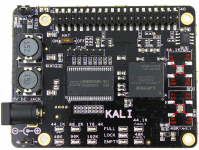
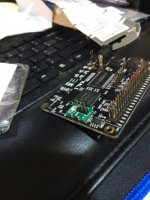
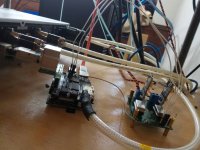
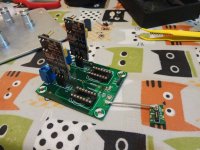
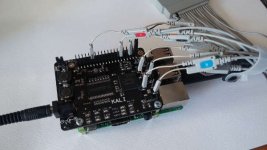





Let me explain why the sound quality of raspberry pi or the computer is very poor, and USB has undergone a conversion to generate more jitter so that USB is more worse. For the digital part, if you want to improve the sound quality, you only have to reduce jitter.
Although the computer CPU will be intermittent in the delivery of packets, and let the packet too slow delivery, but the order of the packet is not chaos. Of course, it may be because the computer clock is not accurate, resulting in too slow or too fast delivery packet. But if the packet is too slow to be passed immediately to the DAC, the sound will be strange, so the packet may be too slow or too fast must be resolved first.
The working principle of the USB chip is basically not much different from CPU. Therefore, as long as the music signal passes through the USB chip, jitter will be greatly increased, which seriously deteriorates the sound quality. The USB isolator or filter actually only makes the USB chip work more stable, reduce jitter, but The USB isolator or filter still can not completely solve the jitter generated by the normal operation of the USB chip, which is caused by the USB, CPU innate design.
The order of the packets will not be destroyed so we have a chances to solve jitter from computer if the reclock board has enough buffer to make the data can be stored more , for example 44khz music signal will transmit delay at least 1 second, and it be solved too slow or too fast delivery packet. That's why when using Ian' FIFO, when you press to play music, you will always hear the sound after one second. It's to solve the tolerances between clocks. It uses the better MCK to continue to pass the data orderly read from the buffer.
Relatively, if the buffer is not big enough, no way to solve too slow or too fast delivery packet , for example less than 1 second delay, and it is difficult using the better MCK to pass the information more correctly.
FIFO itself maybe not necessary, but the main useful because his buffer is big enough and send the packet back to the DAC using a better quality clock chip. The whole process is called reclock.
Based on our understanding of jitter, it is easier to understand why CD is still the best music storage medium, not a hard drive.
A WAV file is made of, for example, 100 data units. When the WAV file is stored on CD, the 100 data units are stored continuously so that the time difference between each data unit is relatively small when the read head reads the data from CD, and there is almost no jiiter.
The same WAV file is stored in the hard driver, the 100 data units may be scattered on the driver, even if the hard drive has been defrag, so that the head read WAV file from the hard driver, the time difference between each data unit is relatively bigger and bigger jitter.
Tape and CD are the same to store continuously the data units, but CD has many holes on the surface of the CD to make the reflected light easily deflected, resulting in jitter. Also, the tape is fixed speed, unlike the CD is not fixed speed. Tape is the best storage media for a music file.
Flash memory is the worst one, because it uses of the same the hard driver with the decentralized storage means and when read WAVE file from flash memory, there will be a large number of transistors are turned on/off, and each switch speed is not the same, this is very easy to produce jitter. Flash memory will have a bunch of high-frequency noise.
Although the computer CPU will be intermittent in the delivery of packets, and let the packet too slow delivery, but the order of the packet is not chaos. Of course, it may be because the computer clock is not accurate, resulting in too slow or too fast delivery packet. But if the packet is too slow to be passed immediately to the DAC, the sound will be strange, so the packet may be too slow or too fast must be resolved first.
The working principle of the USB chip is basically not much different from CPU. Therefore, as long as the music signal passes through the USB chip, jitter will be greatly increased, which seriously deteriorates the sound quality. The USB isolator or filter actually only makes the USB chip work more stable, reduce jitter, but The USB isolator or filter still can not completely solve the jitter generated by the normal operation of the USB chip, which is caused by the USB, CPU innate design.
The order of the packets will not be destroyed so we have a chances to solve jitter from computer if the reclock board has enough buffer to make the data can be stored more , for example 44khz music signal will transmit delay at least 1 second, and it be solved too slow or too fast delivery packet. That's why when using Ian' FIFO, when you press to play music, you will always hear the sound after one second. It's to solve the tolerances between clocks. It uses the better MCK to continue to pass the data orderly read from the buffer.
Relatively, if the buffer is not big enough, no way to solve too slow or too fast delivery packet , for example less than 1 second delay, and it is difficult using the better MCK to pass the information more correctly.
FIFO itself maybe not necessary, but the main useful because his buffer is big enough and send the packet back to the DAC using a better quality clock chip. The whole process is called reclock.
Based on our understanding of jitter, it is easier to understand why CD is still the best music storage medium, not a hard drive.
A WAV file is made of, for example, 100 data units. When the WAV file is stored on CD, the 100 data units are stored continuously so that the time difference between each data unit is relatively small when the read head reads the data from CD, and there is almost no jiiter.
The same WAV file is stored in the hard driver, the 100 data units may be scattered on the driver, even if the hard drive has been defrag, so that the head read WAV file from the hard driver, the time difference between each data unit is relatively bigger and bigger jitter.
Tape and CD are the same to store continuously the data units, but CD has many holes on the surface of the CD to make the reflected light easily deflected, resulting in jitter. Also, the tape is fixed speed, unlike the CD is not fixed speed. Tape is the best storage media for a music file.
Flash memory is the worst one, because it uses of the same the hard driver with the decentralized storage means and when read WAVE file from flash memory, there will be a large number of transistors are turned on/off, and each switch speed is not the same, this is very easy to produce jitter. Flash memory will have a bunch of high-frequency noise.
There is no time difference between data on the CD neither between data on the hard drive and so on.
The timing is a feature of the digital to analog conversion, the media have no timing theirselves, they only provide data not timing.
As long as data are bit perfect the media does not matter.
The RPI outputs bit perfect data therefore no issue from this perspective.
The problem is the clock provided by the RPI to the DAC that acts the digital to analog conversion (WS or bit clock depending on the DAC), not the data because they are bit perfect.
The poor quality of the clock provided by the RPI is the only problem.
So you need the asynchronous reclocker to feed the DAC with a better quality clock.
Unless you get the RPI slaved and synced to a better quality clock (one master clock for each sample rate family not a single oscillator with PLL like in the RPI).
GOOD LUCK!
The timing is a feature of the digital to analog conversion, the media have no timing theirselves, they only provide data not timing.
As long as data are bit perfect the media does not matter.
The RPI outputs bit perfect data therefore no issue from this perspective.
The problem is the clock provided by the RPI to the DAC that acts the digital to analog conversion (WS or bit clock depending on the DAC), not the data because they are bit perfect.
The poor quality of the clock provided by the RPI is the only problem.
So you need the asynchronous reclocker to feed the DAC with a better quality clock.
Unless you get the RPI slaved and synced to a better quality clock (one master clock for each sample rate family not a single oscillator with PLL like in the RPI).
GOOD LUCK!
There are many factual errors in post #35 - be aware. So many that I don't have the inclination to sort all of them out.
If you feel that you are not an absolute expert on these matters, don't write long technical explanations of something that you more or less seem to be guessing about.
Just one example - the post is full of errors and misconceptions.
...."hard driver with the decentralized storage means and when read WAVE file from flash memory, there will be a large number of transistors are turned on/off, and each switch speed is not the same, this is very easy to produce jitter"
Absolute nonsens.
//
If you feel that you are not an absolute expert on these matters, don't write long technical explanations of something that you more or less seem to be guessing about.
Just one example - the post is full of errors and misconceptions.
...."hard driver with the decentralized storage means and when read WAVE file from flash memory, there will be a large number of transistors are turned on/off, and each switch speed is not the same, this is very easy to produce jitter"
Absolute nonsens.
//
Last edited:
It's certainly a thread for the gulible.
Hes even incorrect regarding how data is read from cd.
If you want to remove jitter from a pi it needs reclocking.
Hes even incorrect regarding how data is read from cd.
If you want to remove jitter from a pi it needs reclocking.
AS338 for 50 bucks or so
Loading.. Please wait. #637951115161 Taobao FOCUS
Accusilicon AS338 Hi-End-









Loading.. Please wait. #637951115161 Taobao FOCUS
Accusilicon AS338 Hi-End-









- Status
- Not open for further replies.
- Home
- Group Buys
- Accusilicon AS318 Ultra Low Jitter Clock GB
